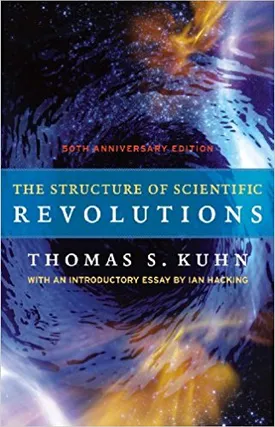Thomas Kuhn
Thomas Kuhn was an American historian and philosopher of science, whose works changed the field of science as we know it. A giant in the field of intellectual history, Kuhn wrote prolifically on subjects such as the history of science, sociology of scientific knowledge, and the philosophy of science. Published in 1962, his most famous work, The Structure of Scientific Revolutions, profoundly changed the course of scientific thought and research, and is seen by many as one of the most influential books in the history of science.
Kuhn was born in Cincinnati, Ohio in 1922, and was raised by German-speaking parents who had immigrated to the United States in 1918. From an early age, Kuhn read extensively in physics and the philosophy of science. He earned a B.S. in physics from Harvard University in 1943, where ironically, he never read a scientific paper or did any laboratory work. After the Second World War, Kuhn continued to pursue his scientific studies at Harvard, earning his PhD in 1949.
Following the completion of his doctoral studies, Kuhn embarked on a series of research fellowships and teaching appointments at universities such as Harvard and Princeton; he also worked in a few physics research institutions. At Princeton, Kuhn taught a seminar in the history and philosophy of science, which led to the publication of his now classic and influentional book The Structure of Scientific Revolutions.
Kuhn’s work at Princeton investigated the history and sociology of scientific knowledge. He argued that science advances not by the gradual accumulation of facts, but rather by a series of discontinuous “paradigm shifts”; revolutionary changes in accepted scientific theories about the world. While this concept was not entirely new, Kuhn’s well-researched and well-argued book made it popular, and changed the way that scientists and philosophers think about the history and development of scientific knowledge.
Kuhn’s work further argued that scientific theories and facts can only be understood within the context of scientific knowledge, and not just objectively. For example, he argued that the facts of scientific experiments should be interpreted through the lenses of the specific paradigm a scientist is working in. This kind of relativistic approach is now commonplace in the philosophy and sociology of science.
In addition to his influential works on the history and sociology of science, Kuhn also wrote extensively other topics, such as the politics of science and scientific progress. His ideas also had a broader cultural impact, notably in the forms of the New Left and postmodernism; both of which have their roots in his works. Kuhn was also a sought after public speaker, having lectured at universities and government institutions around the world in Europe, Japan and the United States.
Kuhn died in 1996, leaving behind a legacy of works that have deeply shaped how we think about the history, sociology and philosophy of science. Had he not so profoundly reoriented how we think about the nature of science, we likely would not have the scientific advancements that we do today. From discussions of the history and revolutions of science, to the relativism of scientific facts and theories, to cultural and political implications of scientific progress, we owe a tremendous debt to Thomas Kuhn for his work, and for the ongoing impact that it has today.

